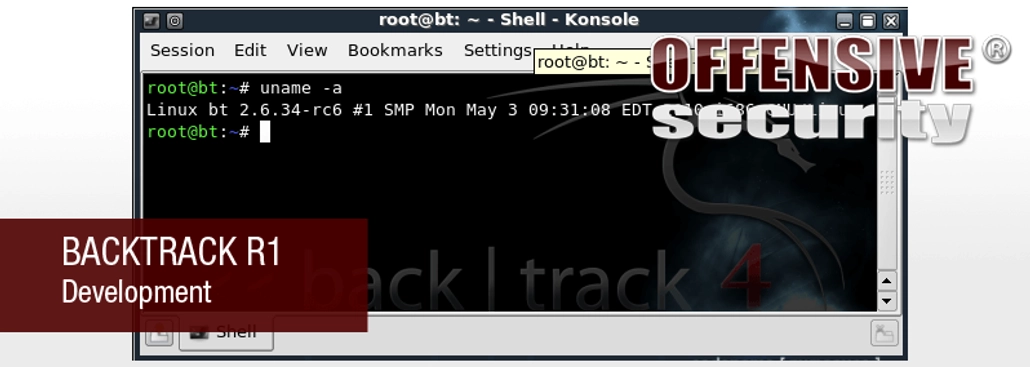
May 5, 2010
BackTrack 4 Release 1 (R1 Dev)
The leading Information Security and Penetration Testing Distribution
The release of BackTrack 4 unleashed a whirlwind of over 1 million downloads. Information Security specialists and Penetration Testers from all over the world showing their support and love for the product that has become the #1 Penetration Testing Distribution. Through an ongoing effort to improve BackTrack we will soon be updating the BT4 kernel to 2.6.34, bringing in much needed hardware support to the world of BackTrack. The new kernel promises relief to Broadcom 4312/5 users, a faster desktop environment, better Intel wireless driver support and much much more. As this kernel change is so dramatic, we will be releasing an unofficial development snapshot with Kernel 2.6.34-rc6 to help us identify kernel and driver compatibility issues which may have popped up.
The unofficial development release will be ready in a few days, as we straighten out last glitches. The new kernel will also be available from our testing repositories, and should allow for a clean upgrade from normal BT4 installations. We will keep you posted on the *unofficial* release through this blog.
Stay in the know: Become an OffSec Insider
Get the latest updates about resources, events & promotions from OffSec!
Latest from OffSec

Research & Tutorials
CVE-2024-39914 – Unauthenticated Command Injection in FOG Project’s export.php
Discover details about CVE-2024-39914, a critical unauthenticated command injection vulnerability in FOG Project ≤ 1.5.10.34. Learn how attackers can exploit export.php to execute system commands or deploy persistent webshells.
Jun 26, 2025
2 min read

OffSec News
What It Really Means to “Try Harder”
Discover how OffSec’s “Try Harder” mantra evolved into a mindset, and how it helps learners build grit, creativity, and real-world problem-solving skills.
Jun 23, 2025
7 min read

Research & Tutorials
CVE-2025-3248 – Unauthenticated Remote Code Execution in Langflow via Insecure Python exec Usage
CVE-2025-3248 is a critical RCE vulnerability in Langflow that allows unauthenticated attackers to execute arbitrary Python code via unsanitized input to exec(). Learn how it works and how to protect your system.
Jun 18, 2025
2 min read
